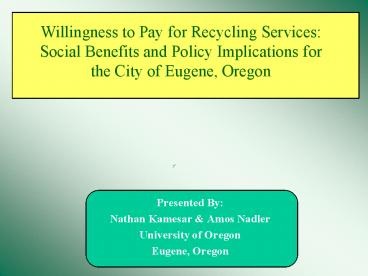Nathan Kamesar - PowerPoint PPT Presentation
1 / 17
Title:
Nathan Kamesar
Description:
How much more Eugene residents are willing to pay for recycling services as ... air pollution, threats to groundwater, odor, noise, litter, and emissions of methane ... – PowerPoint PPT presentation
Number of Views:73
Avg rating:3.0/5.0
Title: Nathan Kamesar
1
Willingness to Pay for Recycling Services
Social Benefits and Policy Implications for the
City of Eugene, Oregon
- Presented By
- Nathan Kamesar Amos Nadler
- University of Oregon
- Eugene, Oregon
2
Todays Objectives
- How much more Eugene residents are willing to pay
for recycling services as compared to other
western United States cities.
- Quantify attitudes and valuations of recycling
program (benefit side of CBA)
- Provide economic value for benefits of recycling
servicesuseful for policy.
3
Background
Waste imposes both private and external costs
Private cost consist of wages, fuel, equipment
landfill costs
External costs added street noise, increased
traffic congestion, more air pollution, threats
to groundwater, odor, noise, litter, and
emissions of methane
In most cities, the price of waste does not
capture the above costs, leading to inefficiencies
- Porter calculates deadweight loss in the industry
of 3.5 billion per year.
SOCIAL COST PRIVATE COSTS EXTERNAL COSTS
4
Recycling services What are the benefits?
WTP (Willingness To Pay) as a measure of social
benefit as defined by subjective valuation of the
service itself and the perceived benefits from it.
5
How do you quantify the unquantifiable?
Measuring the benefits of recycling services
through survey.
CVM Contingent Valuation Method is used to
quantify values that cannot be discerned or
observed in a market context. Commonly used for
valuing animal species, forests, fish yields and
other public goods.
nonexcludability indivisibility
6
Method for Getting WTP
Ask people their willingness to pay for recycling
services each month using a double-bounded
dichotomous choice model. Biases could exist,
yet DBDC model addresses them.
Starting pt bias, strategic bias, hypothetical
bias, information bias
7
The Data
Acquired from a comprehensive study by David
Aadland and Arthur Caplan of 40 cities across the
western United States that sampled approximately
100 residents from each as well as conducting
in-depth interviews with a number of recycling
managers. Respondents were asked standard
demographic questions (e.g. age, income, gender,
education), whether they participate in their
recycling programs and what their attitudes
towards the environment are.
8
The Variables
9
Hypothesis
We hypothesized that Eugene residents are willing
to pay more for recycling services than those
from other cities. We predicted that there will
be strong statistical evidence for this claim.
Aggregate WTP will be a substantial dollar amount.
10
Econometric Methodology
Developed a model representing relationships
between peoples WTP and selected
characteristics. We used a statistical model
where the dependent variable is a WTP value
taking into account the above mentioned
characteristics. We use regression analysis to
predict a WTP given certain values for the above
mentioned variables.
11
Eugene Shifts demand upward
0.99
DEugene
DNon-Eugene
12
Eugenes Attitudes
13
The Results
As a persons Education level increases by one
year, WTP increases by 0.33 (99 confidence)
As Income increases by 10,000, WTP increases by
0.10 (91 confidence)
As Age increases by one year, WTP decreases by
0.07 (99 confidence)
Males are willing to pay 1.01 less than females
(99 confidence)
Eugene residents are willing to pay 0.99 more
than nonresidents (98 confidence)
14
8.25 per month for
recycling services
THE WTP is
36 years old, female, earns 48,576, 14 years of
education
15
WTP Across Income Levels for the Average
Eugenian (excluding education from the
regression)
36 years old, female
16
Aggregate WTP
478,467 per month Calculated by multiplying the
number of households by the average WTP for the
city of Eugene.
17
Thank you!
























![READ[PDF] The Smart Set: George Jean Nathan and H. L. Mencken: George PowerPoint PPT Presentation](https://s3.amazonaws.com/images.powershow.com/10095290.th0.jpg?_=20240810087)






